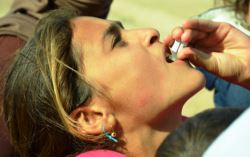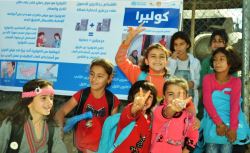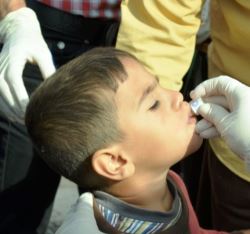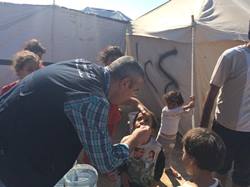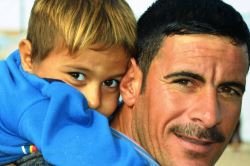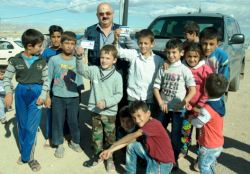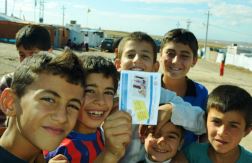 1 November 2015 | Erbil, Iraq - An estimated 250 000 displaced persons will be targeted during the oral cholera vaccine (OCV) campaign to help control cholera outbreak in Iraq. The World Health Organization (WHO) has mobilized 510 000 doses of OCV, and the 2-dose campaign is part of a strategy to prevent cholera transmission in high-risk areas and avert a potentially large-scale cholera outbreak in the 62 camps for refugees and internally displaced people.
1 November 2015 | Erbil, Iraq - An estimated 250 000 displaced persons will be targeted during the oral cholera vaccine (OCV) campaign to help control cholera outbreak in Iraq. The World Health Organization (WHO) has mobilized 510 000 doses of OCV, and the 2-dose campaign is part of a strategy to prevent cholera transmission in high-risk areas and avert a potentially large-scale cholera outbreak in the 62 camps for refugees and internally displaced people.
Preparation for the campaign is now in its final stage in 14 governorates. The campaign begins with an initial round of vaccinations during the first week of November followed by – after, as required, a minimum 14 days' interval – a second round of doses, which will complete the vaccination. For such a campaign to be effective, it is vital that a second dose is administered. Targeted social mobilization, campaign logistics and health education are key components to ensure the successful implementation of OCV. In order to achieve herd immunity, all members of a family above one year of age will be vaccinated.
Cholera outbreak
The cholera outbreak in Iraq continues to pose a threat inside the country as well as among its neighbouring countries. Since the start of the outbreak on 15 September 2015, the Ministry of Health has reported 2173 laboratory confirmed cholera with 2 deaths from 15 out of 19 governorates.
The trend of cholera cases has been declining in the last 2 weeks, however, some of the central and southern governorates namely are still reporting confirmed cholera cases. Over the last 7 days, only one confirmed cholera case was reported from the northern governorates which comprise Kirkuk, Erbil, Dahuk and Suleimaniyah.
Oral cholera vaccine
An OCV is proven to be effective and can protect individuals by 85% in the short-term and 65% over 5 years with a good safety profile. Evidence shows that high coverage of OCV in the target population can result in significant reduction of disease transmission in the vaccinated communities.
The pre-emptive use of OCVs in emergency situations was recommended by WHO in 1999, and the use of OCV is not regarded as a replacement for proven public health interventions such as improving the water, sanitation, and hygiene situation in the target areas.
In early October 2015, the Ministry of Health of Iraq decided to use OCV to prevent a potential cholera outbreak in the camps and to supplement the existing preventive measures implemented by the Ministry of Health and health partners. WHO, in collaboration with the Ministry of Health, conducted a comprehensive cholera risk assessment to identify the high-risk groups and priority areas to be used the cholera vaccination. The assessment team used the WHO’s risk assessment matrix and decision-making tool for the use of OCV in complex emergencies and concluded a high risk of cholera existed in the internally displaced person and refugee camps.
WHO’s response
WHO has been supporting the Ministry of Health and partners to scale up the cholera response interventions, including the establishment of C4 coordination mechanism, enhanced early warning surveillance, improved case management practices, water quality monitoring and chlorination, improved sanitation and hygiene practices in high-risk areas, risk communications and prepositioning cholera supplies in strategic places.
To ensure that effective surveillance, case management and infection control and laboratory support are in place, WHO has deployed epidemiologists from the headquarters and regional office, as well as experts from International Centre for Diarrhoeal Disease Research, Bangladesh through the Global Outbreak Alert and Response Network to Iraq since the outbreak was confirmed. Further, WHO donated adequate medical supplies to MoH and facilitated the distribution of these supplies to treatment facilities across the country.
Related links
Facebook page: cholera vaccination campaign in Iraq
WHO ramps up response to cholera outbreak in two regions
Prevention and control of cholera outbreaks: WHO policy and recommendations
Photo gallery
